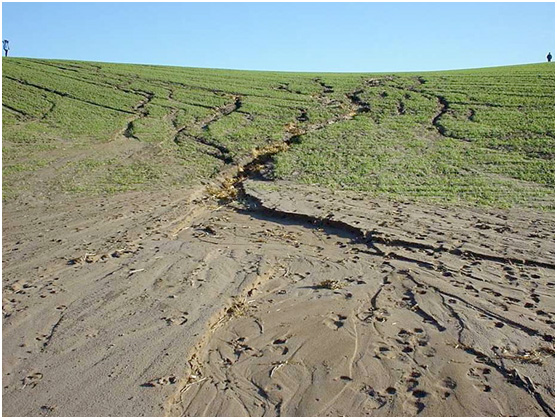Soil erosion - the forgotten player in the global change debate

Research published in Nature Geoscience claims that we have seriously underestimated the role that soil erosion plays in global change.
Soil scientists estimate that for every person on the planet an average of five tonnes of soil is eroded every year by rain, water, wind and tillage. That's around 35 thousand million tonnes of soil in total each year.
But the authors of the report say that erosion has a double impact on the planet - washing away vital nutrients from the soil but also, surprisingly, helping lock carbon into the soil and preventing it from reaching the earth's atmosphere.
The paper 'The impact of agricultural soil erosion on biogeochemical cycling' argues that if we are to produce accurate climate change models we need to start thinking of agricultural landscapes as dynamic, mobile systems, which can cause 'major modifications' to carbon, nitrogen and phosphorus cycles.
It says that the effect erosion may have on nutrients that are of key importance to virtually all life on earth, including mankind, has been overlooked in the global change debate. In fact the amount of nitrogen and phosphorus lost through soil erosion is about equal to the amount of fertilisers being added to agricultural soils every year.
Erosion damage is likely to hit the poorest part of the global population hardest. In some regions people are struggling to maintain the fertility of their soils with nutrient losses outstripping fertilizer inputs. For example, soils in Africa often have poor fertility. Soil erosion associated with reduced vegetation cover and the loss of soil carbon can trigger catastrophic and irreversible shifts in agricultural land in a relatively short time frame, worsening the fate of the rural African population.
However, erosion also greatly affects the soil's ability to store carbon, a key factor influencing climate change. More carbon is stored in soil than in any other medium on earth. There is around 340 tonnes of carbon for every man, women and child on the planet, which is three times more than is stored in all the vegetation on the planet. Contrary to general opinion, soil erosion may not reduce carbon storage in soils but rather increase it, as carbon rich soil becomes buried in sediments, thereby locking in carbon for perhaps thousands of years. Soil erosion may therefore help to reduce carbon emissions.
Professor John Quinton of Lancaster University Environment Centre, one of the authors of the report, said:
"Clearly erosion is bad news for the planet in terms of our ability to feed a growing population, but this new evidence raises some interesting questions. Soil is key to the survival of our species. Not only does it provide us with nutrients for food production but it also protects us from climate change by storing huge amounts of carbon, preventing it from entering the earth's atmosphere.
"Our analysis shows that agricultural landscapes are far from static: large amounts of nutrients are being moved around the terrestrial environment but we are only just beginning to appreciate how extensively this affects soil carbon storage.
"We need to consider soils as mobile systems to make accurate predictions about global changes. This is of primary importance, given that the imbalance between carbon and nutrient fluxes owing to erosion threatens the sustainability of food production and human welfare in many parts of the world.
"Soils urgently need our protection. Our challenge will be how we overcome the barriers that prevent farmers and other land users from adopting soil conservation practices, and maintaining them, so that our soils can be sustainably managed for future generations."
The authors of the report are John N. Quinton1*, Gerard Govers2, Kristof Van Oost3 and Richard D. Bardgett1
e-mail: J.Quinton@Lancaster.ac.uk